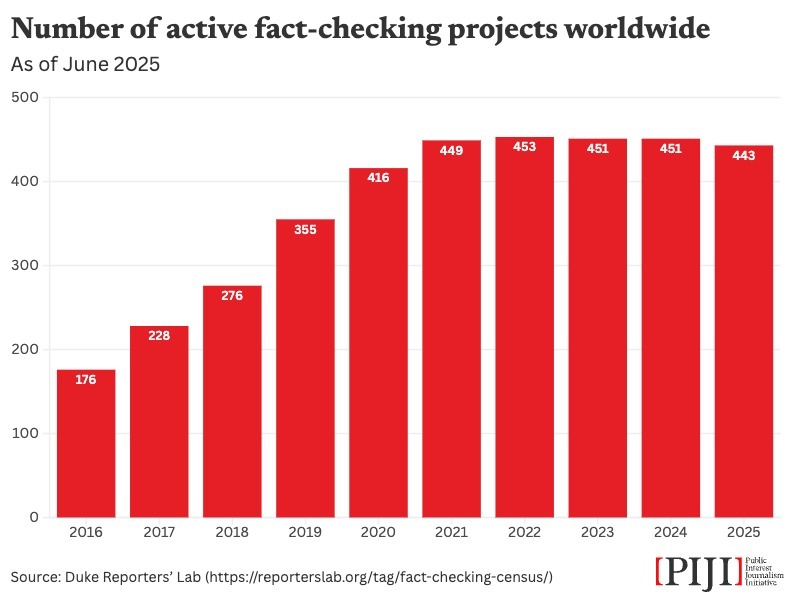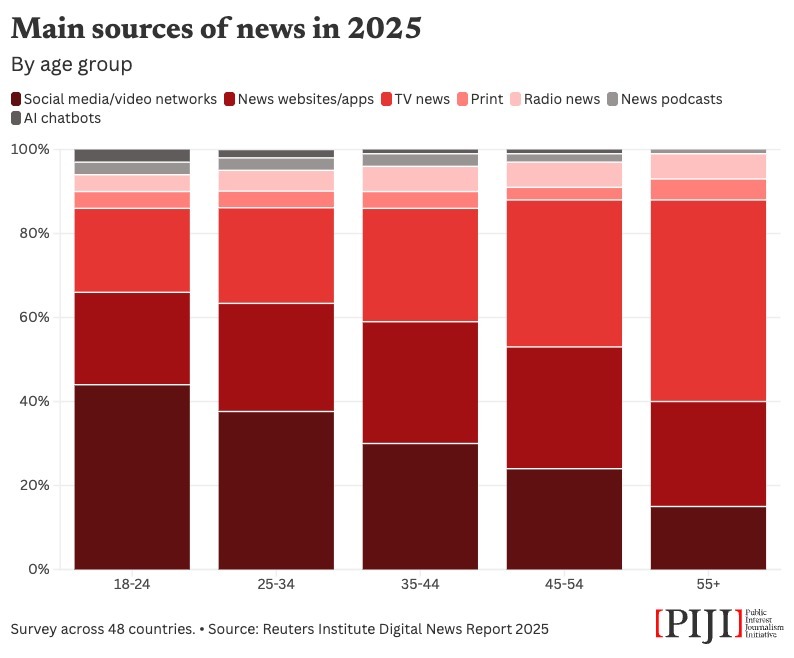The credibility of public interest journalism relies on factual reporting, yet media teams committed to uncovering the truth are struggling to endure.
“The politicisation of facts has become a really big problem,” ABC News Verify lead Matt Martino tells PIJI.
“We’ve seen that with the rise of far-right conservative politics in the US and Donald Trump, who really makes a sport of playing the ref instead of playing the ball … If we can’t agree on a set of verifiable facts, then democracies don’t stand a chance, because we can’t actually make decisions based on good information.
“I don’t think fact checkers should be beyond criticism, but instead of being attacked on who they are, they should be attacked on their analysis and … if you can’t poke holes in that analysis, well then, you don’t really have a case against them.”
On a global scale, tech giants like Meta and Google have been rolling back investments in third-party fact-checking,
This year, Meta announced it would replace fact checkers with community notes to reduce censorship and political bias – echoing Trumpian rhetoric – while Google phased out its fact-checking program, ClaimReview, and told the EU it would not add fact-checks to search results.
In Australia, Google ended its funding of local fact-checking by letting its deal with AAP FactCheck expire, and Meta is expected to do the same next year.
Fact-checking has also come under fire from right-leaning media and politicians in Australia, most notably in the lead-up to the Voice referendum, which saw several false claims disproved by fact-checking teams.
Room for more fact checkers
Australia currently hosts three dedicated fact-checking projects: AAP FactCheck, AFP Fact Check and ABC News Verify.
However, ABC News Verify focuses more on analysing stories being spread online than the political-lean of typical fact-checking, and AFP has just one digital investigation journalist based in Australia.
Until recently, a further two local fact-checking projects were supported by RMIT University; a collaboration with ABC called RMIT ABC Fact Check met a reportedly abrupt end in 2024, and RMIT FactLab appears to have quietly shuttered later the same year. In May 2025, the university launched a monthly newsletter, The Repost, to share collated news about misinformation and fact-checking.
AAP FactCheck editor Ben James tells PIJI there is room for more teams, but the “incredibly important” work is expensive and time-consuming.
He emphasises Australia has “fantastic” reporters, but they are often too busy churning out stories to spend days investigating a single issue or claim.
This is why dedicated fact checkers are needed, but he says finding a way to make the work sustainable is difficult.
“For us as a fact-checking organisation, it’s about being nimble,” James says.
“It’s about realising that opportunities will come and go, the way we do things will shift slightly, the challenges that we have to meet will change. Being able to adapt … will enable us to continue.
“Factual reporting is the bedrock of a functioning democracy, so we see it as such an important thing we do.”
He says AAP FactCheck’s ‘three-pronged approach’ includes:
- Debunking: Investigating claims to judge their accuracy.
- Prebunking: Predicting narratives and manipulation techniques to come, and ‘inoculating’ audiences by warning them of disinformation before it spreads.
- Media literacy education: Spreading knowledge and skills to help people safely process and understand the barrage of information they face.
Martino says better funding for media in general is also needed, as the “rivers of gold” in advertising that newspapers and television once enjoyed have been swept up by tech giants – even though their platforms are heavily reliant on news content.
“The way [those platforms] operate is people talk in them. But those people don’t have anything to talk about unless there’s news … and so [the platforms are] piggybacking off organisations that do this media work without adequately compensating them for that work,” he says.
“It’s not necessarily, ‘Should the social media giants be handing over money?’, it’s, ‘Should someone?’ and the answer is yes, we should fund media well and independently, and we should fund fact checkers well and independently.
“How we do that? Unfortunately, I don’t have any good solutions. It’s very difficult.”
The Australian government hopes to incentivise digital platforms to enter or renew commercial deals with local news publishers with the News Bargaining Incentive, which will see charges applied to eligible platforms which refuse to make deals.
A consultation paper on the measure is due for release this year.
Written by Sezen Bakan

